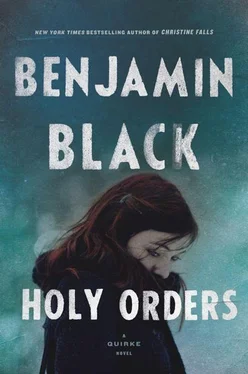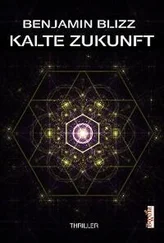Packie shook his head sorrowfully and turned to appeal to Quirke. “Isn’t the Hacker here a fierce suspicious hoor?” he said. He smiled benignly at the detective, yet for a moment it seemed to Quirke that the tiny space into which the three of them were crowded had grown narrower still. “Is that why you’re out here today, now, is it, Mr. Policeman?” Packie said, his voice suddenly grown soft. “To be accusing me of being a sramala and robbing the state of its valuables?”
Hackett smiled back at him. “No, indeed, Packie,” he said blandly, “that’s not why I’m here.”
Packie nodded slowly, narrowing again his wolfish gray eyes. He was still standing at a stoop, and now he lowered the backs of his thighs against the rim of the cold stove and seemed to relax, giving a soft sigh.
Quirke had finished his drink and glanced again in the direction of the milk bottle. He was aware that anything might happen here, that any kind of violence might break out at any moment, for Packie the Pike was plainly a dangerous man. He did not care. He wanted another drink. Hackett seemed perfectly at his ease, sitting there in his big overcoat with his hands resting on his fat thighs and his hat on the bed beside him. Quirke was speculating, as so often, as to what might be going through the detective’s mind. Perhaps nothing was happening in there, behind that forehead marked with a thin pink crescent made by the seam of his hatband; perhaps at moments such as this Hackett functioned entirely by instinct. Quirke wondered how that would be. As for himself, it seemed to him he had no instincts, or not the kind that the detective would operate by; everything Quirke did, so he felt, was predetermined by laws laid down he did not know when, or how, or by what agency. He was a mystery to himself, now more than ever, in this new and terrifying mental confusion that had befallen him.
The tinker leaned forward and grasped the milk bottle by the neck and filled up again the three little glass pots.
“Tell me, Packie,” Hackett said, revolving his glass on its base, “do you know of a young fellow by the name of Minor — Jimmy Minor?”
Packie, leaning back once more against the stove, did not look at him. “Minor?” he said, and made a show of reflecting deeply. “Who would he be?”
“He was a reporter,” Hackett said. “For the newspapers.”
The tinker was looking into his drink. “Why would I know him?”
“What I’m asking is if you knew him.”
There was a silence. Quirke watched the detective. Hackett, he reflected, was like one of those jungle predators that go slack and still at the approach of their quarry. Perhaps that was what it took to be an investigator, that capacity to wait in watchful calm, patiently.
Packie the Pike sucked his teeth. “What would a newspaper man be doing out here?” he said.
Hackett turned his gaze to the rounded ceiling. “Well, he might, for instance, have been asking after a certain cleric who I’m sure you do know.”
Packie glinted at him. “What cleric?”
“Father Michael Honan — Father Mick. You do know him, now, Packie, don’t you?”
Packie scowled, and said nothing, and looked away again.
Quirke brought out his cigarette case, clicked it open, and offered it flat on the palm of his hand to the tinker. Packie took two cigarettes, clipping one of them behind his ear. Leaning down to the flame of Quirke’s lighter he gave Quirke a merrily conspiratorial glance, and winked. The lighter’s petrol smell blended with the big man’s stink and Quirke felt his nostrils constrict. In his mind he saw again the phantom dog under the caravan rootling in the guts of its splayed and twitching victim. Malachy — he would go to see Malachy this evening, yes, yes, he would. Malachy would help him. He had a sensation of falling, slowly falling, inside himself.
There was a sound outside and a face appeared at one of the little square windows behind Packie’s shoulder, a young man’s face; it was there for a moment and then was as quickly gone as it had come. Quirke did not know if Hackett had seen it.
“What do you say, Packie?” Hackett said. “Tell us, now, did the newspaper chap come out here to ask about Father Mick?”
Packie gave a sort of growl deep in his throat. “I have no dealings with the cuinnes ,” he said.
“Cuinne?” Hackett murmured, cocking his head to one side. “That’s a word I don’t know, Packie.”
“The cuinnes —the priests!” Packie said. “Them are for the women to be dealing with, and the gatrins . The cuinnes do be always on about sending the young ones to school, when they’re not cajoling the women to tell them their shakos .”
“Shakos?” Hackett said, elaborately frowning. “That’s another one I never heard of.”
“Their sins,” Packie said, with a dismissive shrug.
“God, Packie,” Hackett said, “we’re getting a great education here today.” He turned to Quirke. “Isn’t that so, Doctor? Words you never knew before.”
The tinker glanced towards Quirke with a sardonic eye. “The Hacker here,” he said, “thinks he’s a great speaker of the Cant — that’s our talk, you know, our own lingo.” He turned back to the detective. “The cuinnes love to hear the women telling their sins. It gives them a rise, so I hear, and sure who’d begrudge them, the poor hoors, with their yokes lashed tight to the inside of their leg to keep them from doing harm.” Again he threw up his head and gave the hooting laugh that was not a laugh.
Hackett put the glass pot on the table and picked up his hat, seeming about to depart. He stopped, however, and raised a hand to his forehead, acting the part of a man suddenly struck by a thought. “Did I mention, by the way, Packie,” he said, “that Minor, the newspaper chap, got himself killed — murdered, in fact?”
Again Quirke seemed to feel the curved walls around them drawing inwards sharply. The poteen had set up a buzzing in his head that was distracting in a faintly euphoric way — he was getting drunk, in other words, and was glad of it. He looked about. He had finished his cigarette and did not know what to do with the butt. He wondered, with vague inconsequence, where the woman kept her things, her clothes, and so on — under one of the beds, maybe? How did they live, these people? He realized he knew nothing about them or their ways. Maybe the woman did not keep her clothes here; maybe there was another caravan, for sleeping in, and dressing in. He thought of the dark glance she had cast at him, of her shining black mane of hair, of the careless slouch of her hips. He thought too of the child’s glance out of those wounded eyes. They knew something, those two, and he wondered what it was. He swallowed more poteen. His temples were tightening and his cheeks had taken on that glassy sensation that drink always brought.
Packie was still leaning against the potbellied stove, gazing with studied interest at the little glass jar he was holding in his fingers.
“You know Father Mick is going away, do you, Packie?” Hackett said. “They’re sending him off to Africa, to convert the Hottentots.” He paused. “He’ll be a great loss to your people, I’d say?”
“I told you,” the tinker said, “I have no truck with them fellows.”
“Ah, but Father Mick isn’t like the rest of them, now, is he?”
Packie gave him a sullen look. “The priests is the priests.”
“I won’t deny that,” Hackett said, turning the brim of his hat in his fingers. “Does he come out here often, Father Mick?”
“He don’t come out at all, anymore,” Packie said. He lifted the glass jar to his lips and emptied it. “He’s not welcome here,” he said. “We don’t need him or his like.”
Читать дальше












